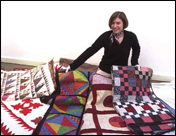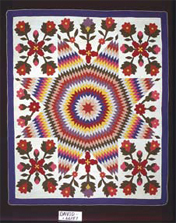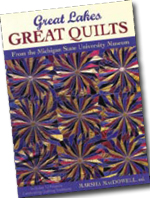Linking Arts and Data Management
- Mark Kornbluh
- Department of History
- College of Social Science

Mary Worral, Quilt Project manager and assistant curator, MSU Museum, displays quilts from the collection
The Internet offers a vast wealth of text, images, video, audio, and other multimedia resources available to any user who takes the trouble to find them. But in order to be useful, rather than overwhelming, access to this information must go beyond simple links. Good tools of data management—of indexing and archiving information—must be simple enough for general audiences to use and, at the same time, complex enough to accommodate constant, exponential change.
Meeting this challenge is at the heart of the work being carried out by MSU's MATRIX – Center for Humane Arts, Letters, and Social Sciences Online, and its director, Mark Kornbluh.
"Users need to be able not just to retrieve information, but to employ it constructively," said Dr. Kornbluh. "While access to online resources has steadily improved in the last decade, online archives and digital libraries remain difficult to use, particularly for students and novice users."

"Star of Bethlehem" quilt by Margeret (or Anna) David, ca. 1920, Peshawbestown, Leelanau County, Michigan
Kornbluh, his team at MATRIX, and their collaborators are addressing the problem with a gamut of strategies that range from micro to macro levels. The goal of these strategies is to link people who understand arts and humanities scholarship with those who know how to design sophisticated electronic search and management tools.
Projects that tackle the challenges of data management from the individual user's
perspective include MediaMatrix, an online, easy-to-use suite of tools developed and patented by Kornbluh and his team, including Dean Rehberger and the late Michael Fegan. MediaMatrix allows users to find, segment, annotate, organize, and publish digital media found on the Internet and in digital repositories.

Book by Marsha MacDowell, MSU Museum Curator of Folk Arts and Professor of Arts and Art History
"Scholars have a long history of working with texts and are comfortable making annotations, summaries, and quotations," said Kornbluh. "Streaming media, however, is another matter. We have often preferred the transcript over the original." MediaMatrix makes it easy for users to create and share their own multimedia libraries (called secondary repositories), complete with customized sound and video clips, and to augment existing catalog records with information of their own. MediaMatrix is available for public use at matrix.msu.edu/~mmatrix.
MATRIX's macro-level projects are represented by large, multi-institutional and often multinational partnerships to develop online exhibitions and libraries. For example, the Quilt Index (quiltindex.org), a partnership
with the MSU Museum that was funded by the National Endowment for the Humanities and the Institute for Museum and Library Services, brings together the resources of quilt collections at major museums and universities from across the country to provide central, searchable access to thousands of quilts documented across individual archives. Quilts can be searched across the collections for patterns, quilters, themes, techniques, and other characteristics.
The curatorial expertise for creating the key fields of information and indexing the collection was provided by MSU Museum's Marsha MacDowell, curator of folk arts and co-director of the project, and her colleagues. Kornbluh's staff contributed the sophisticated database structure for an integrative index and a distributed, Web-based delivery system.
- Written by Cathy Gibson, University Outreach and Engagement